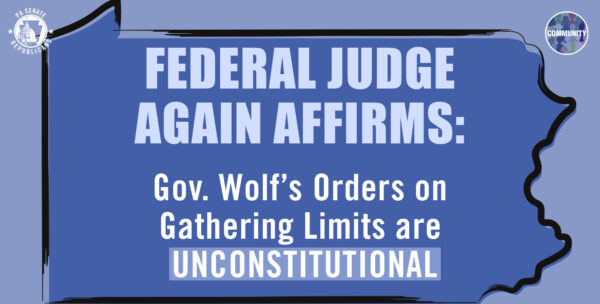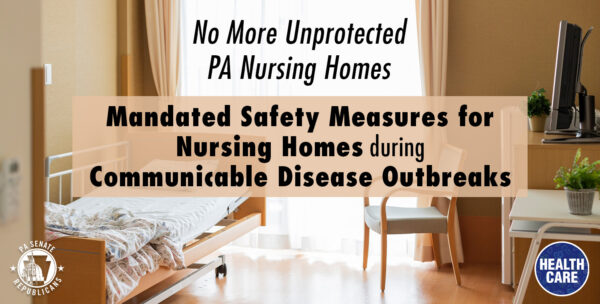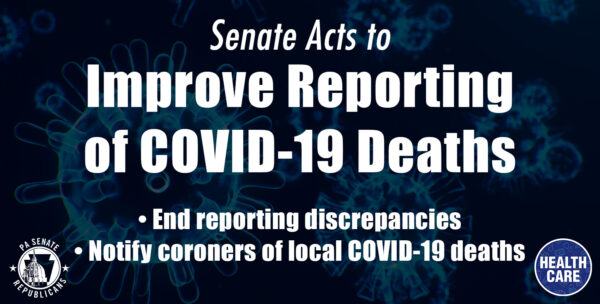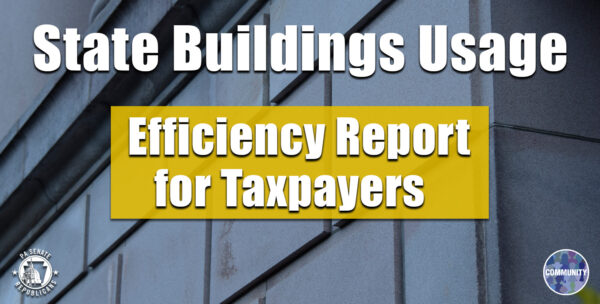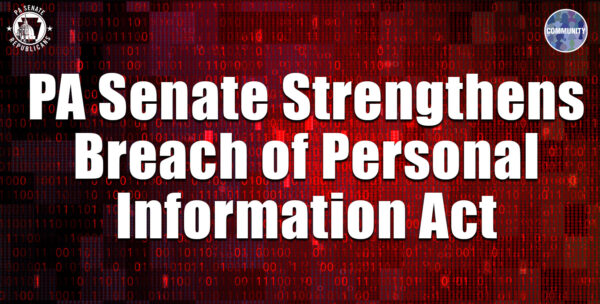
|
|
|
In This Update:
DiSanto Advances Bipartisan Government Reform LegislationThis week the Senate State Government Committee, which I chair, approved two important government reform initiatives regarding redistricting standards and congressional term limits, which now go to the full Senate. Senate Bill 1242 would introduce greater transparency into the redistricting processes for state legislative and congressional districts and establish additional map-drawing criteria designed to prevent extreme partisan gerrymandering and promote accountability to voters. As a long-time advocate for government reform and as someone who wants voters to choose their representatives and not the other way around, I hope the advancement of this bill will serve as a catalyst for key stakeholders – Republican, Democrat, Independent and Non-Partisan alike – to come to the table, compromise, and finally get this issue to a point where all agree, regardless of who gets elected, the districts are in fact fair. Passed in an 8-3 bipartisan vote, SB 1242 is the first redistricting reform bill to advance in the Senate or House since Senate Bill 22, a constitutional amendment I co-sponsored to establish an independent redistricting committee, was approved by the Senate State Government Committee in April 2019. Senate Resolution 377, which I sponsored, calls for a Convention of States under Article V of the United States Constitution to enact term limits for members of Congress. It complements existing legislative proposals that would establish term limits for members of the state General Assembly. As someone who has personally limited himself to two terms, I believe elected office is a calling to serve our fellow citizens, not a career predicated upon individual advancement or reelection. Despite many answering the call with good intentions, we have seen how careerism and self-preservation in the insular halls of power in our nation’s Capitol leads to the service of entrenched special interests rather than one’s constituents. These are just the latest government reforms I’ve championed. I have always sought to lead by example–I donate the automatic-cost-of-living increase to charitable causes, have turned down the taxpayer-funded pension, and support legislation to ban cash gifts and per diems for lawmakers. I also authored Act 1 of 2019 to forfeit the pensions of elected officials and public employees that abuse their positions of power to commit felonies. Committee Approves DiSanto Newborn Screening BillThe Senate Aging and Youth Committee advanced my legislation, Senate Bill 983, to strengthen the Commonwealth’s newborn screening program to better protect infants from rare diseases. Newborn screening performs a critical role in early recognition and treatment of genetic diseases and disorders which, without intervention, may result in permanent disability or death of a child. Under current law, the Department of Health maintains a short list of mandatory screenings and a longer list of optional ones whereby some hospitals choose to screen for the full panel while many others do not. This has created a system in which the testing of newborns is dependent on where they are born in the state or whether their parents have knowledge of these screening panels. My legislation seeks to ensure children born in Pennsylvania are screened equally for every disease on the federally recommended screening panel, as well as those conditions recommended by Pennsylvania’s Newborn Screening and Technical Advisory Board. The bill makes the current supplemental screening panel mandatory and empowers the advisory board to add any clinically recommended disorders for screening in the future. I offered this solution after meeting with my constituent Lesa Brackbill of Hershey, who tragically lost her young daughter, Tori, before the age of two. The Krabbe Disease that claimed Tori’s life was treatable had it been detected early; however, it was not because Pennsylvania’s program did not mandate screening for this disease. I commend Lesa for her leadership and passionate advocacy over the past four years. She has worked tirelessly to improve Pennsylvania’s deficient screening program that failed to protect her child. My legislation seeks to prevent similar tragedies from happening to other young families and newborns. With committee passage, Senate Bill 983 now moves to the full Senate for consideration. Judge Denies Wolf Administration’s Request to Delay Ruling on Gathering Restrictions
Last week, a federal judge ruled that the Wolf Administration’s business shutdowns and restrictions on large gatherings were unconstitutional. This week, the judge affirmed that ruling and denied the governor’s request to delay implementation while the administration pursues an appeal. The ruling makes it clear that the governor’s restrictions on gatherings (no more than 25 people indoors or 250 people outdoors) cannot be enforced. Although these restrictions were struck down as unconstitutional, I encourage community residents to use common sense and consider CDC and your own healthcare provider’s guidance on issues such as attending gatherings, maintaining social distancing and wearing a mask in public spaces. I am hopeful that this ruling will serve as a wake-up call that we cannot follow one-size-fits-all approaches to combat this pandemic. We need cooperation at all levels to find real solutions that work for each individual community to protect both lives and livelihoods. Effort to Override Governor’s Veto of School Sports Bill Fails in the House
Governor Wolf vetoed bipartisan legislation this week that would have ensured school districts could make the final decision on allowing school sports, extracurricular activities and spectators during the 2020-21 school year. Unfortunately, an effort to override this veto in the House of Representatives fell short. Although the bill was approved by more than two-thirds of lawmakers in both the Senate and the House on final passage, the vote to override the Governor’s veto fell short in the House by just four votes when more than two dozen House Democrats who originally supported the bill reversed course and threw their support behind the Wolf Administration instead of standing up for school officials, parents and student-athletes. Despite the failed effort to override the veto, school sports and activities are set to continue this fall under PIAA guidelines. However, the failed override effort means that the Wolf Administration will maintain the authority to halt these activities at any time. Senate Votes to Ease Wolf’s Arbitrary Restrictions on Restaurant Industry
The constantly shifting guidance and severe restrictions placed by the Wolf Administration on Pennsylvania bars and restaurants has created a serious strain on the industry and jeopardized the jobs of more than 500,000 employees. A bill approved by the Senate this week would ease the most burdensome restrictions on these businesses while ensuring they can continue to operate safely. The legislation would set the minimum capacity for bars and restaurants at 50 percent, with the ability for increased capacity if their premises allows. In addition, the bill would remove the ban on bar service, eliminate the meal requirement to purchase alcohol, and allow for event venues to operate at a minimum of 50 percent capacity. Bill to Protect Nursing Home Residents Earns Senate Approval
Residents of nursing homes and other long-term care facilities faced the greatest threats from COVID-19, and approximately two-thirds of all deaths attributed to the virus were residents of these facilities. The Senate took action this week to better protect some of our most vulnerable populations against the threat of contagious diseases. The measure would require the Secretary of Health to ensure long-term care facilities follow and implement disease prevention and control guidelines from the U.S. Centers for Disease Control and the Centers for Medicare and Medicaid Services during an emergency declaration. In addition, the legislation would ensure no individual who has tested positive for a communicable disease within 14 days is placed in a facility without being placed in isolation. Under the bill, the Secretary of Health would be prevented from forcing the admission of a patient to a long-term care facility without considering the ability of the facility to care for the patient. Measure Would Improve Transparency on COVID-19 Death Reporting
As early as April, serious discrepancies began to emerge on the number of COVID-19 deaths that were being reported by the Department of Health and county coroners. A bill approved by the Senate this week would help eliminate these inconsistencies. The legislation would ensure county coroners are notified of all suspected deaths in their jurisdiction caused by this virus and other contagious diseases that constitute a health emergency. The bill would aid county coroners in investigating the facts and circumstances surrounding suspected COVID-19 deaths and other cases of death by contagious disease. Bill Would Create Tougher Penalties for Endangering First Responders
The Senate approved a bill this week that would rebrand the state’s “Steer Clear Law” as the “Move Over Law” to ensure motorists know how to react when approaching an emergency response area. The legislation would better protect law enforcement, fire and EMS personnel, tow truck drivers and other emergency responders. The measure also increases fines and points for violations and boosts public awareness of the responsibilities of motorists approaching an accident scene. Locally, we suffered the tragic loss of Tyler Laudenslager of Halifax when, as a tow truck operator, he was struck while responding to a disabled vehicle this past July. I am hopeful the House will act on it quickly as we seek to avoid similar tragedies for the families of our emergency responders. Legislation Could Prevent Phone Number Spoofing By Telemarketers
Telemarketers frequently “spoof” phone numbers to trick consumers into answering calls by making it appear as if their call originates in the same area as the recipient. Legislation approved by the Senate this week would prohibit this practice in the future. The bill would prevent any individual or entity from engaging in caller ID spoofing in order to defraud, cause harm or obtain anything of value from another person. It would also prohibit telemarketing and robocalls between the hours of 8 p.m. and 8 a.m. Senate Honors Prisoners of War, Servicemembers Missing in Action
The Senate approved a bill this week that would honor our nation’s prisoners of war and servicemembers missing in action by requiring all PennDOT and PA Turnpike service plazas, welcome centers and rest stops to fly the POW-MIA flag. The bill is intended to serve as a lasting tribute to those brave soldiers still missing in action and the families who have lost their loved ones. Legislation Approved to Reduce Unused Office Space, Save Taxpayer Dollars
A bill that would help curb costs to taxpayers by reducing unused officed space earned the approval of the Senate this week. The measure would require executive, independent, and state-affiliated agencies to report their space usage on an annual basis to identify ways to reduce costs and make the best use of existing resources. Over the past three decades, Pennsylvania has seen a 26 percent reduction in the number of state employees without any evidence of a corresponding reduction of office space. I am proud to have led by example on government efficiency. I reduced by half the number of permanent district offices from my predecessor and instead set up mobile outreach offices in existing, free facilities like libraries and municipal buildings. I also employ the least staff of any of the 50 senators, saving taxpayers hundreds of thousands of dollars every year. Senate Passes Bill Requiring Notification of Information Breaches
The Senate approved a bill this week that would protect consumers by requiring timely public notification when a security breach compromises personal information held by state agencies. The bill updates the Breach of Personal Information Notification Act to require state agencies victimized by a breach involving personally identifiable information to report the incident to those affected within seven days. The legislation also requires the state Attorney General be informed of any breach and for executive branch agencies to notify the Office of Administration within three days following a breach. |
|
|
|



2024 © Senate of Pennsylvania | https://www.senatordisanto.com | Privacy Policy |
